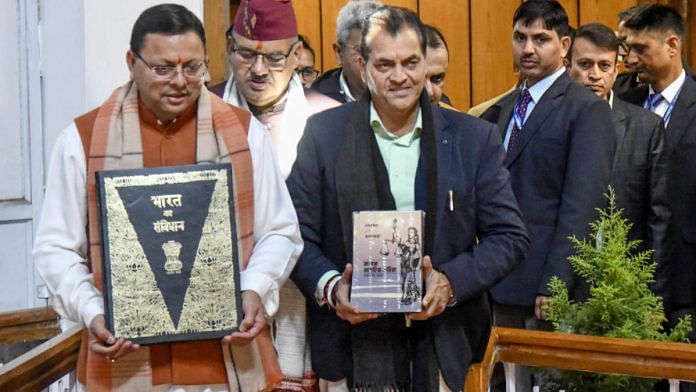New Delhi: The Uttarakhand government Tuesday tabled the Uniform Civil Code (UCC) Bill in the state Assembly which proposes banning the practice of polygamy and child marriage, and criminalisation of nikah halala, among other things. The Bill further proposes a common law on marriage, divorce, land, property and inheritance for all citizens irrespective of their religion in the state, but excludes the Scheduled Tribes.
It also recommends a uniform marriage age for men and women across religions, while also listing “degrees for prohibited relationship”. The marriageable age for men and women remains 21 and 18, respectively.
Uttarakhand Chief Minister Pushkar Singh Dhami tabled the Bill, which has drawn criticism from the Opposition.
A five-member committee, headed by retired Supreme Court judge Ranjana Prakash Desai, had been constituted by the Dhami government in May 2022 to prepare a draft Uniform Civil Code for implementation in the hill state. The panel also included retired high court judge Permod Kohli, social activist Manu Gaur, former chief secretary Shatrughan Singh and Doon University vice-chancellor Surekha Dangwal. The panel collected feedback, written and online, and held several public outreach programmes while engaging with over 60,000 people after which it drafted a 749-page report containing several recommendations.
Also Read: Muslim men have found a way around Modi’s triple talaq ban—torture wife to give khula
Proposals on marriage and divorce
Section 4 of the proposed UCC Bill sets up conditions for solemnising/contracting a marriage, stating that a “marriage may be solemnised/contracted between a man and a woman, if the following conditions are fulfilled, namely (i) neither party has a spouse living at the time of the marriage”.
The criteria for divorce applicable to husbands will also extend to wives, according to the Bill. It further includes the right to remarry the divorced spouse without any condition, such as “marrying a third person before such remarriage”.
This prohibits nikah halala, a practice in some sections of the Muslim community. Nikah halala stipulates that once talaq (divorce) is final, a husband cannot remarry his former wife unless she marries another man, consummates that marriage, and gets divorced again.
The Bill proposes that if a woman is forced or compelled to marry a third person before remarriage, the person found to be compelling her can be sent to jail for three years and a fine of Rs 1 lakh can be imposed.
The Bill also points out that “no marriage solemnised/contracted before or after the commencement of this Code shall be dissolved in any manner except in accordance with the provisions of this Part, notwithstanding any usage, custom, tradition, personal law of any party to the marriage or any enactment to the contrary”.
Under the condition for marriage provision, the Bill has retained the “custom” exception from the Hindu Marriage Act for married parties within the “degrees of prohibited relationships”.
There is exemption for marriages between parties within the degrees of prohibited relationships if the custom or usage governing one of them permits marriage between the two, unless these customs and usage, the Bill states, “are not against public policy or morality”.
The ST population has been completely exempted from the ambit of the proposed law. Tribal communities are estimated to constitute 2.9 per cent of Uttarakhand’s population.
The Bill states: “Nothing contained in this code shall apply to the members of any Scheduled Tribes… and the persons and group of persons whose customary rights are protected under Part XXI of the Constitution of India.”
(Edited by Nida Fatima Siddiqui)
Also Read: Indian govt has left Muslim women at the mercy of AIMPLB. Bring in UCC but consult us first



